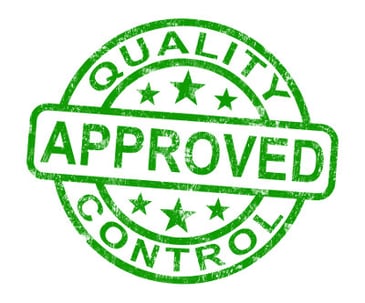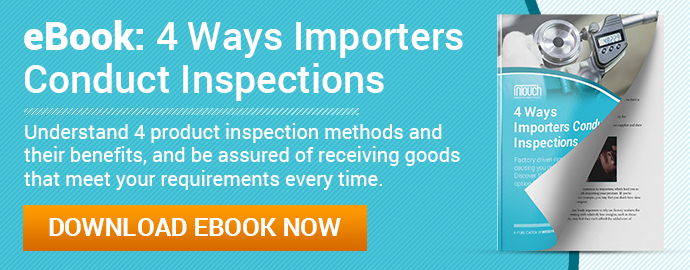 Some suppliers respond negatively to an importer telling them they’d like a third-party inspector to check the product at the factory. You might hear a supplier say something like “we don’t need them” or “we have our own quality control staff”.
Some suppliers respond negatively to an importer telling them they’d like a third-party inspector to check the product at the factory. You might hear a supplier say something like “we don’t need them” or “we have our own quality control staff”.
And it’s hard to blame them. They’re being asked to allow a stranger to come into their facility and check their work. Understandably, some suppliers feel they’re being subjected to unfair scrutiny from an outsider. But usually, all the importer wants is an extra set of eyes on the product to make sure it meets requirements before shipping.
So how can you put your supplier at ease with the inspection process?
One of the best ways is to explain to them how inspection can actually be helpful for them and improve the relationship they have with you. With that in mind, here are three benefits of third-party inspection for suppliers:
1. Improved product quality
One of the most important benefits of third-party inspection for suppliers is the quality improvement that often results. Sometimes inspection reveals a product defect that’s easily preventable. Regardless of whether the defect is major, minor or critical, knowing about it before shipping helps the supplier address the root cause to correct the underlying problem (related: 3 Types of Quality Defects in Different Products).
easily preventable. Regardless of whether the defect is major, minor or critical, knowing about it before shipping helps the supplier address the root cause to correct the underlying problem (related: 3 Types of Quality Defects in Different Products).
Consider an order of headphones handed out on airline flights. The headphones might look acceptable on the outside, but closer examination reveals many with shoddy wiring and press marks on the ear pads. These problems have the potential to make the goods unsellable. And rather than shipping the headphones with defects, the supplier might allow outside product inspection of the order.
A during-production, or DUPRO inspection, might be used here to identify which stages in production are responsible for those particular defects. Once the faulty process is found and adjusted:
- The customer is better off because they can now be more confident in avoiding the same defects in the future; and
- The supplier benefits because the factory’s processes are improved, and they can provide better products to all their customers that buy headphones.
It’s no wonder importers often prefer to work with suppliers that will allow third-party inspection. It shows the supplier is open to constructive criticism or feedback that might lead to quality improvement. And a supplier that resists outside inspection may be trying to hide something from their customer (related: What to Do When Factories Resist Third-Party Inspection).
"An #inspection can mutually benefit a #supplier AND #importer"A third-party inspector’s role as quality consultant
It’s important not to misunderstand the role of the inspector or inspection company in improving product quality at a factory. The product inspector’s role is typically limited to identifying quality defects and nonconforming units. Although an inspector may have years of experience verifying a specific product type, such as headphones, that’s not to say they’re able to point out the process that’s causing a defect (related: 4 Things a Product Inspection Report Will NOT Tell You).
Sometimes a third-party inspector or inspection company can suggest processes that might be contributing to quality problems. But for more complex problems, it’s often better to hire a manufacturing consultant or other firm qualified to conduct a process audit. A process audit differs from a product inspection in that it focuses on the production processes at a factory.
2. Improved relationships with customers
When considering the benefits of third-party inspection for suppliers, improving the relationship you have with your supplier should be near the top of the list.
 An importer that doesn’t have any external oversight into the status and condition of their order can’t be sure what they’ve paid for until they actually receive the finished goods. Similarly, the supplier isn’t able to get feedback from their customer on the goods until the customer sees them. And a difference between what the supplier and the importer believe is acceptable is one of the main reasons why the relationship between the two parties can turn sour.
An importer that doesn’t have any external oversight into the status and condition of their order can’t be sure what they’ve paid for until they actually receive the finished goods. Similarly, the supplier isn’t able to get feedback from their customer on the goods until the customer sees them. And a difference between what the supplier and the importer believe is acceptable is one of the main reasons why the relationship between the two parties can turn sour.
Preventing a mismatch of product expectations
Let’s return to the headphones example from earlier. Maybe factory staff catch the wiring issue by testing a sample of the finished product that comes off the line. But perhaps they don’t realize that the press marks on the ear pads are a problem you can’t accept. The supplier might repair the units affected by the wiring issue but neglect to address or inform you of those with press marks.
Now your level of transparency is limited. You may have a well-developed QC inspection checklist, but it doesn’t include potential defects you weren’t aware of beforehand. The supplier ends up sending you the finished headphones without knowing there’s a problem with them. And your relationship with your supplier suffers because of a difference in product expectations.
The problem of misaligned expectations is best prevented by being clear upfront, well before mass production begins. But there are often issues—like the one above—that can be difficult to anticipate. By bringing in product inspectors to check the product before shipping, the supplier is able to:
- Show the customer the actual condition of the product and status of production;
- Elicit any feedback from the customer to prevent substandard or nonconforming goods from shipping; and
- Preserve the relationship they have with their customer by ensuring the product is satisfactory before it ships.
When suppliers cooperate with inspections, they help assure their customer that finished goods will meet expectations for quality. And this check creates trust between customers and suppliers and contributes to a healthier business relationship overall (related: 3 Tips for Stronger Supplier Relationships).
Preventing customer chargebacks due to poor quality
Suppliers and importers both tend to avoid shipping an order full of defective goods. Defective or substandard products hurt the importer and their customers. And often a dissatisfied importer will chargeback their supplier for an unacceptable number of defective units in an order—that is, if they don’t find a new supplier altogether. One of the lesser-known benefits of third-party inspection for suppliers is that they can avoid chargebacks by having the order inspected prior to shipping.
A final pre-shipment inspection serves as the last line of defense against shipping goods that don’t meet the buyer’s requirements. By checking the product before shipping, the importer is able to see a detailed report of the order. They can then make an informed decision about whether to ship the goods, or possibly, hold the order for rework. The result is typically a stronger relationship between the supplier and importer.
3. Less disruption than from direct inspection by the importer
As an importer, it’s usually helpful to visit your supplier and, if possible, the factory that’ll be manufacturing your product. This is a great way to get to know the people  you’ll be dealing with and to start that relationship on level footing. But it’s important to realize that visiting a factory to conduct product inspection can be somewhat disruptive.
you’ll be dealing with and to start that relationship on level footing. But it’s important to realize that visiting a factory to conduct product inspection can be somewhat disruptive.
When there’s a final inspection being performed on your headphones, for example, the majority of the goods will likely be finished and packed in shipper cartons. To inspect the goods, factory staff typically need to be delegated to opening cartons and re-packing them after inspection. In this way, resources that might otherwise be used elsewhere in the factory for production need to be diverted to helping with the inspection.
But when the importer travels to the factory to inspect the goods directly, the potential for disruption is greater for a couple reasons:
- While the importer may be an expert in their product, they’re typically not an expert in quality control or the inspection process and tend to work less efficiently.
- Factory management and staff may feel the need to impress their customer, which can mean changing the way they normally operate and resulting in lower efficiency.
Conversely, a professional inspector is very familiar with the inspection process. They tend to work much more efficiently to inspect the most number of units of product in a limited period of time. And since they’re a third-party inspector, factory management and staff don’t typically go out of their way to impress them the way they might a customer.
"An independent #inspection will help you determine the true quality of a #supplier"Most experienced importers will want to have their product inspected before shipping, whether they do it themselves or hire a third-party to do it for them (related: Independent Inspection vs. In-House Inspection). And all of these differences mean the process is generally less disruptive, which is one of the benefits of third-party inspection for suppliers.
Conclusion
Although suppliers are sometimes opposed to third-party inspection, there are many ways that they can benefit by allowing independent inspectors in the factory. Your product quality and their production processes can both be improved by inspection. If your supplier is striving to meet your expectations as best they can, it doesn’t make sense to resist inspection.
So if you’re working with a supplier that’s reluctant to allow a third-party to inspect, remind them of these three main benefits. Any reasonable supplier should be able to appreciate the value you both can get from inspection.
Have you seen any other unexpected benefits of third-party inspection for suppliers? Let us know in the comments below!







